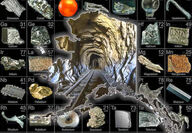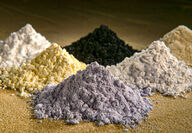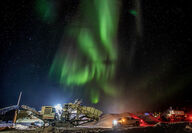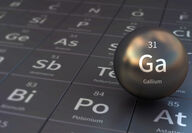Sorted by date Results 26 - 50 of 140

Gold dominates Alaska mineral exploration, but a critical shift arises. Since the discovery of gold in what is now the Alaska capital city of Juneau, prospectors, geologists, and fortune seekers have spent more than 140 consecutive summer seasons exploring The Last Frontier's golden potential. With these endeavors turning up rich aurum lodes in every corner of the state, except for the oil-rich North Slope, the nearly century-and-a-half tradition of seeking and discovering wor... Full story

From antimony historically mined near the Interior Alaska city of Fairbanks to the zinc and germanium produced at the Red Dog Mine, America's 49th State is a past producer, and a potential future source of the minerals and metals deemed critical to the United States. Earlier this year U.S. Geological Survey updated and expanded its list of critical minerals to include 50 minerals and metals essential to the economic or national security of the U.S. and which has a supply... Full story

Supply, demand, and risks to the US supply chain define criticality Metaphorically speaking, critical minerals are not set in stone. Instead, the criticality of these basic building blocks of modern society shifts with the demands for any given mineral, the ability of the mining sector to keep pace with that demand, and the geopolitics of where that supply comes from. "Mineral criticality is not static, but changes over time," said Steven Fortier, director of the National...

US invests heavily into developing domestic rare earth element processing plants Despite what their name suggests, rare earths are not all that scarce. An efficient and environmentally sound technology capable of separating this tightly bonded group into the 15 individual elements of innovation, however, is truly unique and the key to establishing a rare earths supply chain in North America. There are currently no commercial-scale rare earths separation facilities in North...

Russia and China's control of global supplies worry DC lawmakers From its uses in flame retardants that have saved countless American lives to being an important ingredient in batteries poised to be the answer to the challenge of storing intermittent renewable energy, few metals are more critical to the national security and economic wellbeing of the United States than antimony. Described as a metalloid, which means it falls somewhere between metals such as zinc and solid...

Those of us who watch such things are well aware that Senator Murkowski has been the strong vocal lead in the Senate when it comes to sounding the alarm that the country is at substantial risk due to our reliance on foreign countries for the critical minerals that we need, not just for our 21st Century lifestyle, but also for our national defense. Over the past decade, Sen. Murkowski has consistently done yeoman service when it came to getting legislation concerning the... Full story

With its world-class mineral potential and favorable mining policies, Western Australia reclaimed the crown as the best place to discover, permit, and build a mine, according to the mining executives that ranked 84 global jurisdictions for the Fraser Institute's Annual Survey of Mining Companies, 2021. Each year, Canada-based Fraser Institute calls on mining executives from around the world to rank global mining jurisdictions when it comes to mineral potential and a broad...

Alaska mines produced roughly $3.89 billion worth of nonfuel minerals last year, a 23% increase over the estimated $3.16 billion produced in the 49th State during 2020, according to Mineral Commodity Summaries 2022 published by the United States Geological Survey on Jan. 31. The rise in Alaska mine production value is largely due to increased zinc and gold production, along with strong metals prices last year. According to early estimates by the Alaska Division of Geological...

While copper may be the new oil of the green energy revolution, a wide variety of industrial minerals and metals found in abundance in Alaska will be needed to build the envisioned low-carbon future. In a 2021 report on the minerals and metals critical to low-carbon energy and transportation, the International Energy Agency estimates that a typical passenger electric vehicle requires six times the mineral inputs of a conventional internal combustion engine car and an onshore... Full story

With more than half of Alaska's entire population living within its region, Cook Inlet Region Inc., more commonly known as CIRI, is the most metropolitan of the 12 landholding Alaska Native regional corporations. While CIRI has leveraged its urban position with retail developments such as Tikahtnu Commons, an enormous retail and entertainment center on the outskirts of Anchorage, the Southcentral Alaska regional corporation also has oil and gas, renewable energy, and mining... Full story

It is hard to quantify which is more impressive, the sheer size of the estate owned by Doyon Ltd. or the rich and underexplored mineral potential on the lands owned by the Alaska Native Claims Settlement Act regional corporation for Alaska's Eastern Interior. Running the breadth of Alaska between the Brooks Range to the north and Alaska Range to the south, the Doyon region blankets a mineral-rich swath of Alaska's Interior that is nearly the size of Texas. Doyon owns 12.5... Full story

Home of the famed golden beaches of Nome that has captured the imagination of millions over the past 120 years, the Bering Straits Native Corporation (BSNC) region covers the Seward Peninsula and coastal lands arcing around the eastern and southern coast of the Norton Sound in the far western reaches of Alaska. While this region may be 300 miles beyond North America's highway system, it has served as a crossroads for human activity for at least 15 millennia and will continue... Full story

A recent agreement between Vital Metals Ltd. and Ucore Rare Metals Inc. marks a major milestone in establishing a complete North American rare earths supply chain with links in Northwest Territories, Saskatchewan, and Alaska. Vital has already established Canada's only rare earths mine at its Nechalacho project in Northwest Territories and is building a processing facility in Saskatchewan to upgrade the high-grade ore into a midstream carbonated product with a mix of rare...

Ucore Rare Metals Inc. Nov. 17 announced that the United States Forest Service has issued a one-year authorization for trenching and bulk sampling at the Bokan Mountain rare earths project in Southeast Alaska. Located on Prince of Wales Island, the Dotson Ridge deposit at Ucore's Bokan Mountain project hosts 4.79 million metric tons of indicated resource containing 31,722 metric tons of total rare earth oxides – 14 lanthanide elements, yttrium, and scandium – plus 1.05 met...

Graphite One Inc. Oct. 13 announced the completion of a 2,052-meter drill program focused on gathering data for a feasibility study on developing a mine at its Graphite Creek project about 35 miles north of Nome, Alaska. A preliminary economic assessment completed in 2017 outlined plans for a mine at Graphite Creek that would produce roughly 60,000 metric tons of 95% graphite concentrate per year and a separate processing facility to refine these annual concentrates into...

Canada is positioning itself as the "global supplier of choice" for the critical minerals and metals essential to tomorrow's technologies, especially the almost unfathomable quantities of raw materials that will be required by a world transitioning to low-carbon energy and electric vehicles. "Demand for minerals and metals continues to grow with an increasing focus on critical minerals – vital in aerospace, healthcare, telecommunications and an array of clean technologies such... Full story

The global transition to electric vehicles plugged into renewable energy sources is powering enormous demand for graphite, the single largest ingredient in lithium-ion batteries. "Graphite demand increases in both absolute and percentage terms since graphite is needed to build the anodes found in the most commonly deployed automotive, grid, and decentralized batteries," the World Bank penned in a 2020 report, "The Mineral Intensity of the Clean Energy Transition." According... Full story

The envisioned green future where every North American is driving a battery-powered electric vehicle charged with renewable energy could be undermined by cobalt, a somewhat scarce and controversial metal that makes lithium-ion batteries better. "Cobalt is considered the highest material supply chain risk for electric vehicles in the short and medium term," the U.S. Department of Energy penned in an April report. This risk has automakers, lithium-ion battery manufacturers, and... Full story

From the transistors in quantum computers that are millions of times faster than their classical counterparts to fiber optic cables that send data at the speed of light, germanium is a little-known semiconductor that is a small but extremely important ingredient in the technologies behind the future of ultrafast computing and communications. Germanium traces its technological roots back to the 1950s, when scientists developed the transistor to replace vacuum tubes in the... Full story

Overshadowed by headline-grabbing rare earth elements, gallium is an underappreciated critical metal that is a vital ingredient in next-generation smartphones and communication networks, light-emitting diodes (LEDs), thin-film solar cells, and medical devices. "The development of gallium arsenide as a direct band-gap semiconductor in the 1960s led to what are now some of the most well-known uses of gallium – in feature-rich, application-intensive, third- and f... Full story

The ability to type, tap, swipe, and scroll your way through articles such as this one from a smartphone, tablet, computer, and now even refrigerators is made possible by indium-tin oxide, which is used as a transparent conducting film applied to virtually every flat-panel display and touchscreen on the market. This thin and invisible layer lying just under the glass senses incoming electrical data triggered by the touch of your fingertip and transforms it into an optical... Full story

Global governments and industries are setting increasingly ambitious targets for the phasing out of fossil fuel-burning automobiles in favor of electric vehicles charged with green energy. Achieving these grand climate objectives, however, is going to require an equally bold strategy to ensure there are plentiful supplies of the new generation of energy minerals and metals critical to building this revolution in the way the world generates and uses energy. The World Bank... Full story

From jewelry at a black-tie soiree to scrubbing harmful emissions from the exhaust system of a farm truck, the six platinum group metals – platinum, palladium, rhodium, ruthenium, iridium, and osmium – are metals that are both precious and critical to the United States and Canada. Extremely rare, durable, and with a brilliance that does not tarnish, platinum and other metals in its group are a treasured choice for high-end jewelry that stands the test of time. Three of the... Full story

Roughly 38,000 metric tons of rare earth concentrates were produced from American soil during 2020, yet the United States remains 100% reliant on foreign countries for its supply of these 17 elements critical to our modern high-tech society – an apparent paradox that speaks to the complexities of these enigmatic metals. The irony of rare earth elements (REEs) begins with their name, which is at the same time a misnomer and accurate descriptor. "All the REEs except p... Full story

An unsung war hero that saved countless American troops during World War II, an overlooked battery material that has played a pivotal role in storing electricity for more than 100 years, and a major ingredient in futuristic grid-scale energy storage, antimony is among the most important critical metalloids that most people have never heard of. While antimony may not be part of the common lexicon, humans have been using this semi-metal for more than 5,000 years. "For example,... Full story